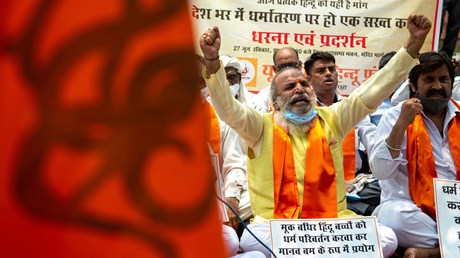New report by international religious freedom advocates compiles the text of 73 laws in 46 nations.

To share your faith—or change it to another—first check your citizenship.
The US Commission on International Religious Freedom (USCIRF) has released a new report on anti-conversion laws around the world. Providing the legal text for 73 separate laws, the compendium notes that 1 in 4 nations (46 total) restrict the right of its people to either adopt or propagate a religion.
“The right to convert from one religion or belief to another, or to no religion or belief at all, is central to [the] protection for religious freedom,” said Susie Gelman, a USCIRF commissioner. “And in countries with anti-conversion laws, religious minorities tend to be broadly targeted for harassment, assault, arrest, and imprisonment.”
Gelman, a three-term president of the Jewish Federation of Greater Washington, cited the example of pastor Keshav Acharya, sentenced by Nepal to one year in prison for allegedly attempting to convert Hindus to Christianity. But he is not the only example.
Last week in India, 9 Christians were arrested for allegedly evangelizing the poor.
Last summer in Iran, 106 Christians were arrested for their religious beliefs.
Last spring in Libya, an American Christian was arrested for alleged missionary activity.
The USCIRF report grouped the laws into four categories. First, anti-proselytizing laws restrict witnessing of one’s faith in 29 nations, including in Indonesia, Israel, and Russia. In Morocco, for example, it is illegal to cause a Muslim to question his or her religion.
The second category of interfaith marriage is restricted in 25 nations, including in Jordan, the Philippines, and Singapore. In Qatar, for example, if a wife converts to Islam but the husband does not, a judge may annul ...
from Christianity Today Magazine
Umn ministry


.gif)

.gif)
.gif)
